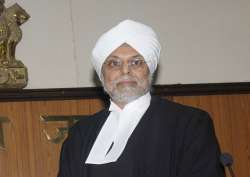Constitution treats everyone equally, be proud of your religion, region and ethnicity: CJI JS Khehar
CJI Justice J S Khehar today said Indians cutting across faith and ethnicity should feel proud of who they are.

Indians cutting across faith and ethnicity should feel proud of who they are, this is what the Constitution is all about, Chief Justice of India J S Khehar said today.
"Whether it is Christians, Buddhists, Hindus, Zoroastrians, Muslims or Jains, everybody should be proud of his own religion to be an Indian. Everybody should be proud of his own ethnicity. Proud of being an Indian and that is what the Constitution is all about," he said.
Addressing the Independence Day celebrations organised by the Supreme Court Bar Association here, the CJI said even though he was not born as a citizen of India, he got equal status and opportunity like anyone else.
"After being a citizen, you are neither inferior nor superior to anyone. You are no less or more than anyone else," he said.
Justice Khehar said the country has a president, who is a Dalit and spent his childhood in a mud hut.
"We have an agriculturalist as our vice president who started his political career by pasting party posters. We have a prime minister who used to be a tea vendor at one point.
"The chief justice of India was not a citizen of this country to start with, but when he became the citizen of this country, he was equal to everybody else and had equal opportunities. This is what citizenship or independence is. The freedom to all to achieve their hopes, ambitions, desires," he said.
"I am proud to be in this country which allows me to feel proud of my religion. I feel proud to be a Sikh by birth and by choice. People must feel proud of their religion, region and ethnicity. And this is what the Constitution is all about," he said.
The CJI told the gathering that he was born as a citizen of Kenya.
Law Minister Ravi Shankar Prasad, who was also present at the event, said one of the major achievements of India's independence was that it did not become a theocracy. He added that the country became secular because of its heritage.
"I hold a very firm view that India is not secular because the Constitution says so. The word 'secularism' was added to the Preamble only during Emergency. India is secular because India's heritage is secular. That flows from the great Rig Veda. Truth is one, wise men interpret it in different manners," he said.
The minister also called for remembering and celebrating the unsung heroes of the freedom movement.
Prasad mentioned about his visit to a village in Assam where nine professors were killed by the British. He also lamented the 'poor condition' of the family of Batukeshwar Dutt, who along with Bhagat Singh, threw bomb in the Central Legislative Assembly of New Delhi during the freedom struggle.
"I would advice you to take a holiday in Andaman along with your children. Go to the Cellular jail where you can find a lot of names who have spend 10, 15 to 20 years there.
"(Veer) Savarkar, I always visit his cell. His brother died there. Do you know where their family is? If you remember them, it will be the best way of showing respect to their contribution," he told the gathering.
Remembering the 'unsung heroes' of the freedom movement, Justice Khehar talked about Abdulla, who killed Culcutta judge J P Norman in 1871 and Sher Ali Afridi, who assassinated Lord Mayo, Viceroy of India on 8 February 1872.
"These people did not run away from the scene. They did not tender any defence. They were put to gallows in Andaman," he said.
Attorney General K K Venugopal also spoke on the occasion.
"Independence is not merely for the well to do. It is also meant for the poor and deprived," he said.